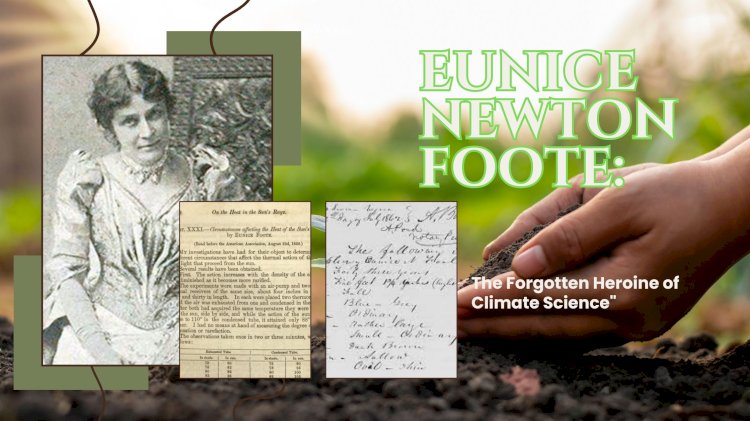"Eunice Newton Foote: The Forgotten Heroine of Climate Science"
Eunice Newton Foote, a remarkable American scientist born in 1819, conducted a groundbreaking experiment in 1856 that demonstrated the link between atmospheric carbon dioxide levels and the Earth's temperature. Despite being overshadowed by her male counterparts at the time, her work resurfaced in the late 20th century, leading to recognition of her significant contribution to climate science. Foote's experiment laid the foundation for our understanding of the greenhouse effect and its impact on global warming. Her story emphasizes the importance of acknowledging the diverse perspectives that shape scientific progress and inspires us to strive for inclusivity and equity in the pursuit of knowledge.
By Shreya Rajvanshi Gangal

Introduction
In the annals of scientific history, there are numerous tales of brilliant minds whose contributions have been overlooked or overshadowed by their contemporaries. Eunice Newton Foote, a name that remains relatively unknown to many, falls into this category. Born in 1819, Foote was a remarkable American scientist whose groundbreaking research on the effects of carbon dioxide on Earth's climate laid the foundation for our modern understanding of global warming. Despite her pioneering work, Foote's name has long been forgotten, overshadowed by her male counterparts. In this article, we will shed light on the life and achievements of Eunice Newton Foote, a true unsung hero of climate science.
The Early Years
Eunice Newton Foote was born in Connecticut in 1819. Raised in a time when women's opportunities in the scientific community were severely limited, she displayed a natural curiosity and intellect from an early age. Despite the prevailing societal norms that discouraged women from pursuing scientific endeavours, Foote managed to educate herself and develop a deep passion for science.
The Groundbreaking Experiment
In 1856, at the age of 37, Foote conducted a groundbreaking experiment that would change the course of climate science. She became the first person to experimentally demonstrate the link between atmospheric carbon dioxide levels and the Earth's temperature. Foote's experiment involved filling glass cylinders with different gases and exposing them to sunlight. She observed that carbon dioxide, among other gases, trapped heat more effectively than others, leading to an increase in temperature.
Foote's findings were presented at the American Association for the Advancement of Science (AAAS) in 1856. Her paper, titled "Circumstances Affecting the Heat of the Sun's Rays," captured the attention of the scientific community. However, her male colleagues, including the prominent physicist John Tyndall, would later replicate and publish similar experiments, overshadowing Foote's original discovery.
Legacy and Recognition
Despite being overlooked in her time, Foote's work was not entirely forgotten. Her findings were mentioned in passing by John Tyndall in his seminal paper on the greenhouse effect in 1861, though without proper credit to Foote. It wasn't until the late 20th century that Foote's contributions to climate science were rediscovered and recognized.
In 2010, historian Raymond Sorenson stumbled upon Foote's work while researching the history of the greenhouse effect. He brought her name back into the scientific discourse, shedding light on her groundbreaking experiment and its significance. Since then, efforts have been made to restore Foote's rightful place in the history of climate science.
Conclusion
Eunice Newton Foote's pioneering experiment on the relationship between carbon dioxide and the Earth's temperature was a monumental achievement. Her work laid the groundwork for our understanding of the greenhouse effect and its role in climate change. Foote's story serves as a reminder that scientific progress is not solely the result of a few well-known individuals but is often built upon the collective efforts of countless unsung heroes.
Recognizing Foote's contributions is not merely an act of historical rectification; it is a crucial step toward acknowledging the significance of diverse perspectives in scientific discovery. Eunice Newton Foote's legacy inspires us to appreciate the countless voices that have shaped our scientific understanding and encourage us to strive for a more inclusive and equitable future in the pursuit of knowledge.
What's Your Reaction?



















